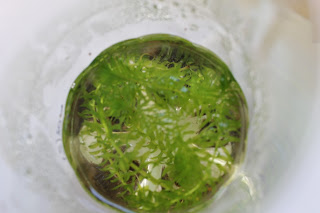Prediction:
|
Actual outcome and comments:
|
|
Plants (Terra zone)
|
The plants will grow as they are equipped with enough resources
(sunlight, water and CO2), and will photosynthesize further providing the
rest of the eco – column with oxygen. Maybe
not as much as in the summer, because they are receiving less sunlight. At the moment, the height of the highest plant is 7,5 cm.
|
The plants did grow as they were equipped with all the necessary resources. It grew by 5 cm (from 7,5 to approx 12,5. I think this result is succesful, because i thought (as it was the change of the season) the weather would worsen (eg. less sunlight), but the rate at which the plants grew were exactly the same as in summer (0ver 3 weeks)
|
Water (Aqua zone)
|
The water level will drop a bit as it evaporates to produce water for
the eco – column (photosynthesis of plants)
|
The water level did indeed drop by 0.7 cm to provied the rest of the eco-column with evaporated water. So my prediction was accurate.
|
Animals/organisms (Decomp and
aqua zone)
|
Our snail will continue feeding off the decomposing granadilla and
tomato. We have water flee in our aqua zone, and they will continue living
off the water.
|
Our snail continued to feed off the decomposing granidilla and tomato and is still alive. Our water flees reproduced and there all now more water flees than before.
|
Soil (Decomp and terra zone)
|
The soil will become drier because of less water evaporating (less sunlight)
therefore slowing down the plant growth.
|
This was found to be false. The soil is still rich in nutrients and can still provide what is needed for the plants to grow.
|
Temperature of room
|
As it is becoming winter the air temperature will lower because it is
getting colder.
|
The air temperature is lowering due to the the change in seasons, but not as much as I thought.
|
Sunlight
|
The eco – column will receive less sunlight as it will be more
overcast in the winter than it was in the summer, therefore slowing down the
process of photosynthesis.
|
We cannot measure the amount of sunlight received but we know that the process of photosynthesis was not slowed down because the plants grew by 5 cm, which is reasonable (if not good).
|
Before pics of our Terra zone:
Before pics of our aqua zone:
After pics of our terra zone:















